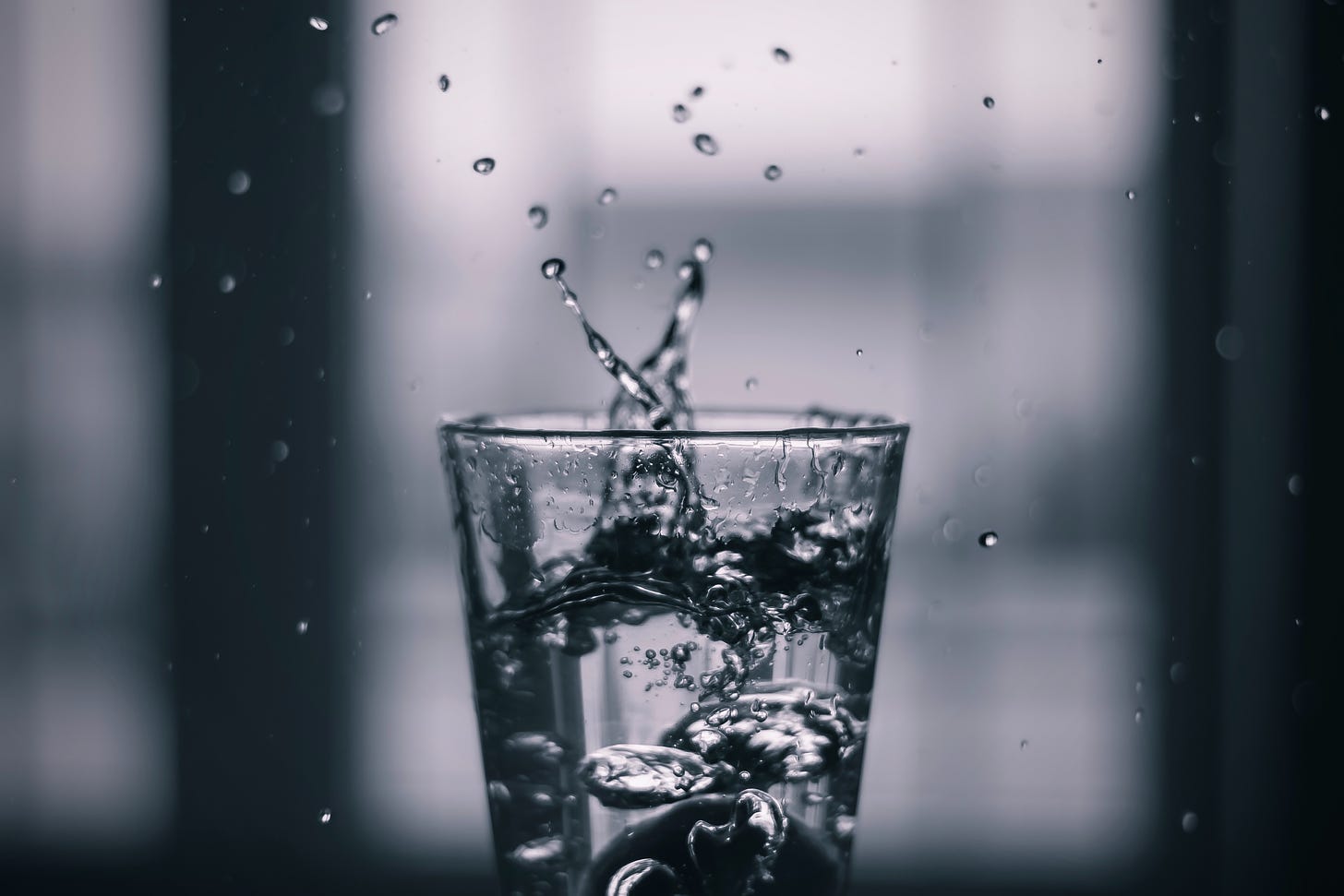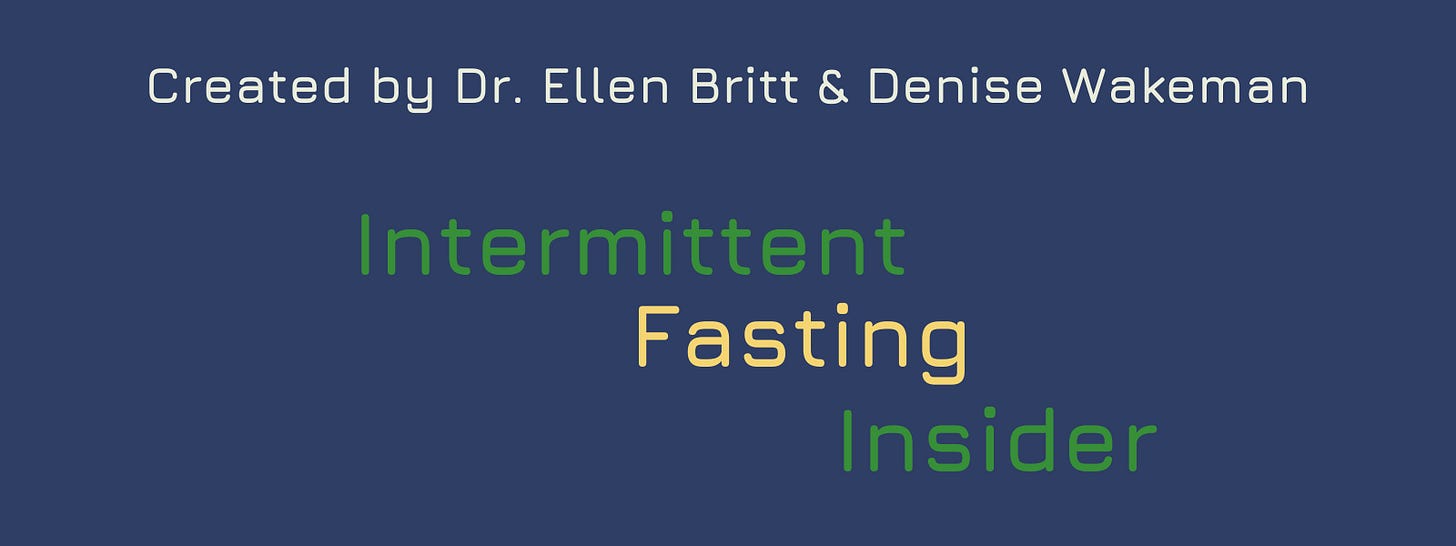In our last issue (IF Insider No. 69), we looked at the fascinating world of binaural beats and how you can use this sound technology to help you relax and relieve stress.
For our premium subscribers, in this week’s Research Spotlight, an intriguing study done in mice that suggests how sick you get (in this case, from a heart attack) may depend on your brain!
Our paid subscribers also get one of Ellen’s recipes each month. Last month we featured Ellen’s SuperGreen Smoothie, combining matcha and broccoli microgreens' flavors and synergistic properties into a powerful “super” drink for your health.
Looking for a supportive group that “gets” your interest in IF and other cutting-edge health information? Our free intermittent fasting Facebook group, with over 1800 members, is a wealth of info, in addition to our new Longevity Experience membership.
Water - The Ultimate Superfood
Here at the Insider, we are big fans of superfoods, those delicious, nutritious, mostly plant-based foods with a concentrated amount of nutrients such as protein, complex carbohydrates, vitamins, minerals, and phytonutrients, and more in a relatively low-calorie serving.
But today, we are going to look closely at a superfood that meets none of the above characteristics yet is essential for life. That superfood is…
Water!

Now wait a minute...how can water, which has no calories and is odorless and tasteless, be a superfood?
Well..let’s just say this. Try going without drinking water or any liquids containing water for a few days and see how you feel! Up to sixty percent of your body is made of water, including two of your most important organs, your brain and your heart which are composed of about 73 percent water. Even your bones are watery and contain about 31 percent of this vital liquid. Before we get into what water does for your body, let’s look at just how much water you should drink daily.
I am NOT one of those people who believes you should carry a huge container of water with you wherever you go, constantly swigging on it and just as constantly having to go the the bathroom to empty your bladder. We have a built-in thirst mechanism in our brains for a reason...to tell us that we are thirsty and that we need to drink something.
Unless your thirst center is out of whack from having a stroke or other neurological or medical disorder, you can rely on your body to tell you when it’s thirsty. And having said that, there are some people who get so busy with work and other stuff they have to do that they overlook or override their body’s natural signal to drink, and so they suffer from low-level dehydration, which can leave you sluggish and out of sorts.
Plus a lot of people don’t realize that they get part of their daily water intake from food...which averages out to about 20 percent. The rest needs to come from water that you drink. Also, the myth that the water in coffee and tea don’t count is just that...a myth and has been pretty much debunked, so yes, you can count the water in your coffee and tea toward your daily intake.
We’ll look at five reasons why water is so important to your health in just a minute, but first, let’s look at why you should not use fresh water in this way.
Yes, it’s good to drink water but just don’t put it up your nose! A woman in Seattle, Washing died recently from a rare brain-eating amoeba. She didn’t get infected by going swimming in a polluted lake but by using tap water to rinse out her sinuses with a neti pot...a popular practice among some folks who have adapted the traditional Indian practice of using this teapot like vessel to flush out nasal passages.
While the organism would have likely been killed off by her stomach acids if she had swallowed it, no such protection existed in her sinuses, and the amoeba invaded her sinuses and then made their way to her brain. She had surgery and her physicians stated that there were amoeba everywhere in her brain tissue, just dining away on her brain cells. So if you are going to use a neti pot or another device that uses water to flush out your sinuses, use only distilled or sterilized water or water that has been boiled and then allowed to cool.
Alright... let's get back to why water is so important to your health.
One - It helps to create saliva which is essential for proper digestion. If your mouth is chronically dry, it may be that you are not drinking enough fluids.
Two - Water protects your joints, your spinal cord, and body tissues. Staying hydrated ensures these vital structures are protected and lubricated.
Three - Water helps with nutrient absorption. Not only does water assist with the breakdown of your food, it also helps to dissolve vitamins and other nutrients in your food so they can be delivered to your body for use.
Four - Water helps to boost your energy by activating your metabolism. Research shows that when your metabolism is boosted it has a positive impact on your energy levels. One study found that when men and women drank 500 milliliters of water (that’s about 17 ounces) their metabolism was boosted by about 30 percent and this effect lasted over an hour.
Five - Water helps with your cognitive function. Studies show that not drinking enough water can negatively affect your alertness, your focus, and even your short-term memory.
And a Bonus Reason - Water can help you lose weight. Some studies (and the participants were women and girls in this research) have shown that drinking more water while dieting and exercising might help you to take off those extra pounds.
So, get adequate water to stay healthy. But don’t get obsessive about it, as it’s not necessary. Simply drink when you are thirsty.
Reference -
Boschmann M, Steiniger J, Hille U, Tank J, Adams F, Sharma AM, Klaus S, Luft FC, Jordan J. Water-induced thermogenesis. J Clin Endocrinol Metab. 2003 Dec;88(12):6015-9. doi: 10.1210/jc.2003-030780. PMID: 14671205.
Why It Matters
“If there is magic on this planet, it is contained in water.”
~ Loren Eiseley (1907 - 1977) was an American anthropologist, educator, philosopher, and natural science writer and poet who brought complex scientific subjects to the general public in beautifully crafted essays and poems and helped to fuel the roots of the modern environmental movement.
What We Are Reading 📚
Ellen - Over two decades ago, when my adopted Chinese daughter was placed in my arms, our Chinese guide, who called himself “Martin” to make it easier for us Westerners, proclaimed I was now part Chinese. Perhaps that explains my enduring fascination for the I Ching or Book of Changes. This ancient oracle has its roots in spoken traditions, and its earliest texts were recorded in writing some 3000 years ago.
But although I Ching texts are readily available, it’s a daunting and next to impossible task to try to sort out what it means. For that, I turn to my favorite I Ching expert, Hilary Barrett, a scholar of all things I Ching and who lives in Oxfordshire in the United Kingdom. Her book, the 2010 classic, I Ching: Walking Your Path, Creating Your Future, is refreshingly clear and uncomplicated. Here’s a short excerpt, to give you a taste of her approach:
“The I Ching is an oracle: something that speaks. Although it comes disguised as a book, it is really a voice in a conversation, and you can talk with it (or with what speaks through it) as you would with a wise friend and mentor.
Talking with an oracle is called divination. When you divine, you listen attentively to hear the question you are asking, and the oracle’s answer; and your own response of recognition. In a world that seems noise than ever, divination offers a quiet refuge for listening. It is the place where your inner guidance comes into resonance with present truth, so that it can never be swallowed up in the circumstantial clamour of reasons, emotions, and opinions.
The I Ching is an oracle, is it not a slot machine to dispense ready made answers. It will not tell you what to door deny your free will by predicting a future set in stone. It gives you insight into the present moment — and who is to say how much of the future is contained within that? It will take you under the surface of experience, into its inner currents, where you can participate in their flow.”
Did you like this article and learn something new? If so, please let us know in the comments! Questions and suggestions for future articles are welcome, too!
Know someone who would benefit from getting access to the IF Insider? Please share it!
Intermittent Fasting Insider is a reader-supported publication. To receive new posts and support our work, consider becoming a free or paid subscriber.





